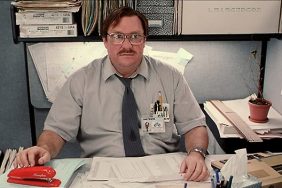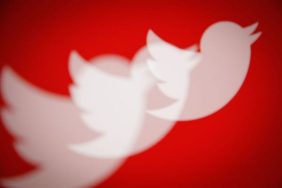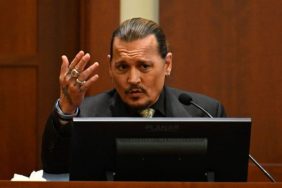You would have thought that Linda Woolverton’s work on The Lion King and Beauty and the Beast would have made her a household name to industry enthusiasts, but her career seems to have really started to soar after the release of 2010’s Alice in Wonderland, one of the few films to ever crack $1 billion at the box office. Woolverton’s revisionist screenplay for Alice in Wonderland helped spearhead a revival of re-imagined fairy tale movies, most of which haven’t shared the same success as her work. The latest entry in the genre, Maleficent, appears to be an exception: it opened to $170 million worldwide, but then again, it had the added benefit of being written by Linda Woolverton as well.
I spoke to Linda Woolverton over the phone shortly before Maleficent‘s release to get answers to some of my burning questions about the film, and accidentally wound up answering one of them myself. We also discussed the genesis of the film’s revenge storyline, the reason why remaking fairy tale movies is so important nowadays, and her future projects, which include the Alice in Wonderland sequel, Through the Looking Glass, and a new TV series she’s pitching now which, sadly, she had to stay fairly vague about. For now.
CraveOnline: You have such an interesting position right now at Disney, recrafting these original movies into something new.
Linda Woolverton: Yeah, it’s fun.
One of the key approaches that you have to take in these movies is to find a way to incorporate the original animated film that everyone’s familiar with, and also tell a new version of the story. In Alice in Wonderland you said the original happened but it was a long time ago, but in Maleficent you say that we never heard it right in the first place. Was that always the approach?
Yes, it was just to tell it… you think it’s this, but we’re going to show you a different version, a different point of view. It’s all about looking at things from a different point of view. You can learn something that way.
I asked Robert Stromberg this question and he said that it was more of a question for you. At the beginning of the film, the voice-over says you’ve heard a different version of this tale, and here’s how it really happened. What I’m wondering is, who’s been telling the wrong version of the tale? Because it seems like at the end, everyone’s on board. Who has been perpetuating the myth, do you think?
Oh, you know I think that’s a question I never even thought about. Maybe the myth just got into the… Huh! That’s a curious question. Who would that be?
I have a theory, if you’d like to hear it!
Okay, let’s have it!
Okay, my theory is because you’ve reframed the three fairies, who were originally Flora, Fauna and Merryweather…
There you go…
…into characters who were a little less capable, a little less heroic, perhaps they – through their skewed perception of what occurred – have been telling their version, in which they are infinitely more proactive and effective than they appear to be in Maleficent, and it sort of spiraled out from there.
Oh, that’s brilliant. That’s it!
Good! Okay, great. Thank you.
That’s exactly it. [Laughs.] No, it’s actually brilliant. That’s brilliant because they would be the only ones who would have the motivation. You’re absolutely right. They don’t to come off so well in this one, right? “Let’s just spin it so we look better. We did spend all those years out there in the woods with this girl, you know? Let’s make ourselves the heroes.” That’s good.
Out of curiosity, it’s a little change, but why did their names change in this version? Is there a particular motivation for that?
Well, when I was conceiving of the characters, it’s all based on a derivation of the characters. It’s all based on fairy lore, and in fairy lore… it’s fascinating, fairy lore. It’s a world mythology and I really did most of my research there. Every fairy or elf or whatever has a purpose and a specific aspect of nature that they protect, so everybody was assigned something. Those three got assigned flowers, so I had to give them names that were appropriate to the flowers. And also we weren’t doing the same characters. I didn’t feel comfortable writing them differently and then assigning the same names. I just game them different names.
Was Maleficent presented to you by Disney, or did you pitch them that you thought this would be an interesting concept?
They came to me for it. They just said, “Do you have a take on Maleficent?” [Producer] Don Hahn came to me with that question.
Where did you start with your approach? Because although she’s a fascinating character we still don’t know a lot about her in Sleeping Beauty.
I guess for me the biggest challenge was what on Earth would motivate a woman to do most evil thing possible, which was to curse an innocent baby. That was the biggest challenge. How on Earth am I going to make her sympathetic, or empathetic, in any way? You are looking at the world through the protagonist’s eyes. You are them. So how do I make her empathetic so we can be rooting for her? So I had to find the thing, the thing that had happened to her, that had caused her heart to… so she could do something like that.
You kind of have to come up with the worst thing imaginable to keep our sympathy for her.
Yes, absolutely. What on Earth, you know? So it had to be some kind of a betrayal. She lost something that was so specifically a part of her, as someone’s child would be.
I was watching the film and I was looking at the way it was structured, and in many respects it does feel like revenge film, one in which we’re looking a victim going perhaps too far but responding to being essentially violated by King Stefan.
Yeah, but not to her running around looking like a victim, because that’s definitely not who she is.
That’s what a lot of best revenge movies do, people who are abused or hurt in some way use it to become powerful, and the only difference between some of these movies is whether allow themselves to become so corrupt by the situation that they are irredeemable, or whether they realize that they too have gone down the wrong path.
Right.
So it’s interesting to me that the majority of the film after the prologue, after the curse, is a redemption tale about someone trying to make good after doing the most horrible thing imaginable.
Right, but you have to have that turn. Where is that turn? When do we let the audience in on that turn?
That’s the part that I started responding very interestingly to, because the trailer kind of promised a Snow White and the Huntsman, it’s a fairy tale but it’s okay because there’s war! But in the end the film was more about a relationship.
So you’re saying that the trailer depicted it as a war movie?
The trailer made it seem a bit more action-y than it turned out to be.
Oh yeah.
It’s really a character piece in a lot of ways.
Interesting. I guess that that’s to entice the boys, you know? […] I don’t make the trailers, but I would guess it’s to bring boys in, to say to the boys that there’s going to be enough cool running around, monsters, things for you.
Which is cool because we’re doing everything we can because we’re doing everything we can get more masculine audiences in to see a film that ultimately is about a feminine experience.
Right, exactly. Exactly, and I think that Alice [in Wonderland] proved that boys will come to girls’ movies.
I think so too. It’s very cool that, of the films that Disney and you have repurposed into live-action, that women have been at the forefront of all of them. That does fly in the face of the perhaps idiotic convention.
Yeah, it kind of does. Maybe it requires that. Maybe it requires a female protagonist to do that.
Do you think that’s by design or do you think that’s more of a coincidence, that Alice and Maleficent were the films that Disney chose to start this approach with?
I don’t know. I think Alice was not intended, it wasn’t an intention. I can’t say that was. My intention wasn’t a large global trend for the Disney company, but it was just really for me thinking about – and I came to them with this one – what would happen if Alice was back as an adult? And it turned into a girl empowerment story, but I think Alice started the fairy tale revisionist thing, except for Wicked, the musical got there first.
Do you think there’s every going to be a time when you’ll want to combine these approaches and put Alice and Maleficent and maybe more live-action Disney characters in the same movie, as a big feminist Avengers?
[Laughs.] Maybe. I don’t know. It won’t be my thing, but okay. I just think that it’s apples and oranges. I don’t know. They’re different worlds, but whatever. There are more creative minds than mine that can jump in that.
We see for example the “Disney Princesses” as sort of a collective of characters that you have to play with, who probably don’t exist in the same world but they exist in the same advertising, for example.
Yeah.
We see them as a unit and we want to see what can be done with them as we bring them into more modern contexts.
Well, I think that’s really the most significant thing. How do you take some of these characters that were conceived in a different time…? Cinderella was conceived in a different time – the 50s? I don’t know – when the Women’s Movement hadn’t been yet, or was just starting up. So it’s not about blaming these characters for being throwbacks. The characters were symbols of their time, and now we’re looking at them and saying how relevant is that to us anymore? We’ve moved on. What can we do about you to change that? Even though you’re still feeding these characters to young minds, how do you spin it so you can see that? That was the point from that day and maybe we’ve all changed since then.
Is the next Alice movie going to be based directly on any of the books, or do you have the freedom to do whatever you want now that the first one was such a success?
It’s called Through the Looking Glass, but I was not constrained in the first either, so. [Laughs.] Pure arrogance on my part, playing in that world. But not, it’s not based specifically on the plot to the book, but the characters, yes.
Are you working on anything else at the moment? What’s occupying your creative energy right now?
I’m pitching a pilot series to television, actually. Today, actually.
Oh, break a leg! You’re doing it later this afternoon?
Yes, I’m actually doing it all week, pitching […] a project that we’re interested in and developing for television, so we’re pitching it around.
That’s awesome. I know some people are superstitious about this but is there anything you can tell me? It sounds exciting.
I can’t, but it’s a property that both of us have worked together for some time and both of us love this property, so it would be a love affair with the property if we can get it done.
That’s awesome.
Yeah, I’m excited.
How does a pitch meeting like that typically go? Do they read the script and you just have to guide them through the rest of the series, or is it more complicated than that?
It’s so complicated! It’s so much more complicated than pitching a movie. It’s so different. You have to really show them the whole series, and all the aspects of it and what’s it like, and why people would watch it and where it goes season after season. You have to really think far beyond just the pilot story, so this has been a challenging experience for me.
How many seasons ahead did you decide to plan?
We have two seasons that we pitch, and then after that we can do whatever we want.
You’ve worked on TV series before. You worked on “Ducktales” and many others…
Yeah. [Laughs.]
In a different capacity, I imagine. Has that world changed dramatically, in your estimation?
I don’t know. I don’t know anything about that world anymore. I stopped doing it to write animated features, and I so don’t know really much about it anymore.
Is there any other Disney property you’d care to reimagine theatrically? Is there a Minister Frollo movie we could see somewhere down the line?
[Laughs.] I don’t know, I actually haven’t put my mind to that. But I don’t know, maybe. I definitely don’t have one at the moment.
Where could you go with Maleficent 2 if it’s a big success? Who could she come into conflict with? I’m fascinated by the possibility.
Well who knows if Angie will be willing to get back in those horns, but it would be a fun thing to think about. [Laughs.]
William Bibbiani is the editor of CraveOnline’s Film Channel and the host of The B-Movies Podcast and The Blue Movies Podcast. Follow him on Twitter at @WilliamBibbiani.









